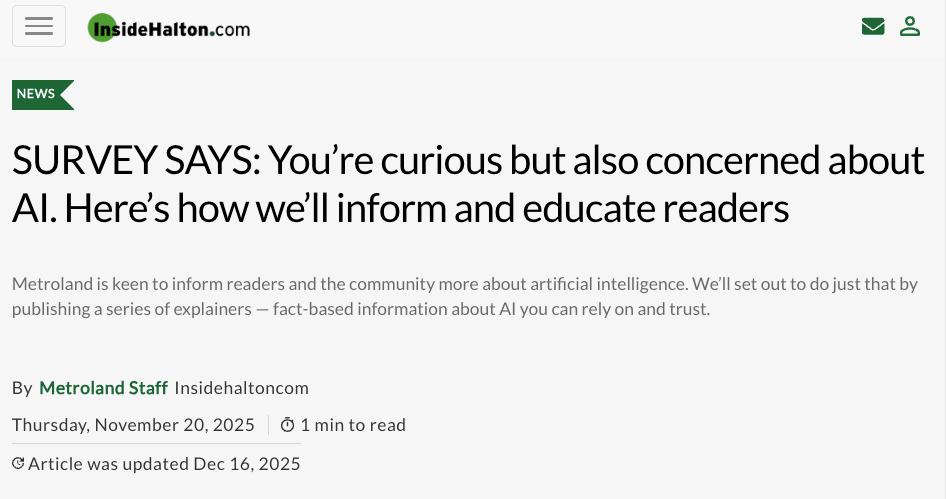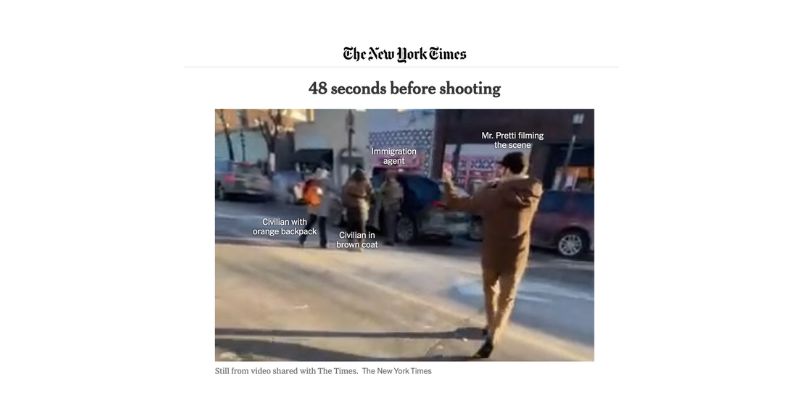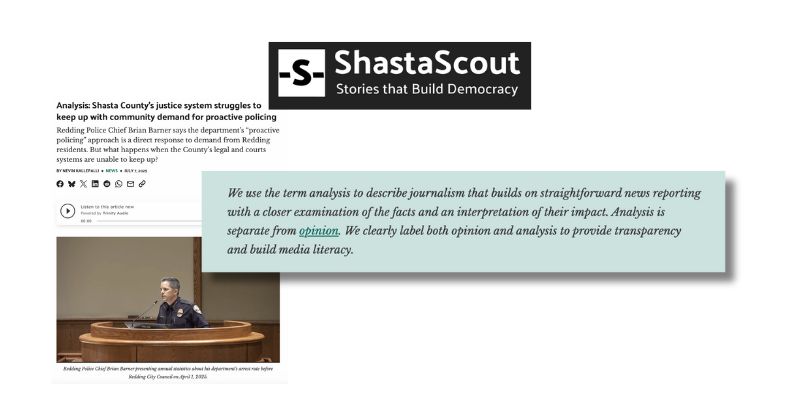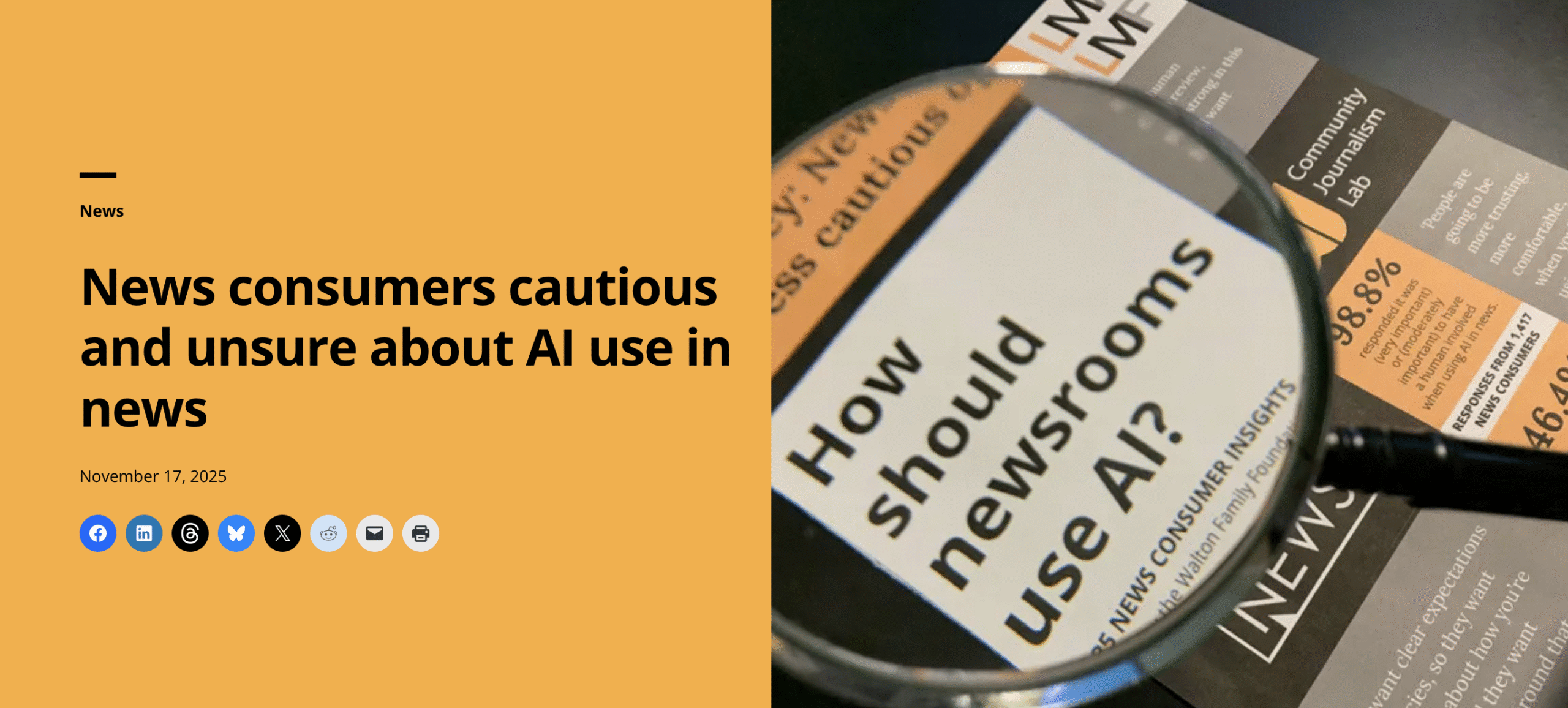
Research shows people want to better understand what AI is and how it’s being used. Journalists can be a valuable resource.
Demystify AI for your community
Want to get this Trust Tips newsletter in your inbox each Tuesday? Subscribe here.
We’ve been sharing tips and takeaways from our new research about how audiences are responding to AI use in news. We’ve learned that people are skeptical about journalists using AI and want transparency about that use. We also learned that highlighting and disclosing your use of AI could lead to distrust, but our firm contention is that disclosure is still necessary.
Over the past few weeks of Trust Tips, we’ve been sharing highlights from this research showing how journalists can build trust with their use of AI.
- We started with the foundational step of engaging and listening to your audience before, during and after you use AI.
- Then we walked through how and why to disclose your AI use (even if it hurts trust).
- Next, we shared how you can go beyond in-story disclosures to be transparent about your use of AI.
This week we are highlighting how AI literacy and other content and initiatives around demystifying AI could help build trust. (And then we’ll tell you about how we want to pay you to help us test ideas!)
In a Trusting News cohort, more than 80% of survey respondents said it would be helpful if a newsroom provided information and tips to better understand AI in general and detect when AI was used in content creation. The demand for education around AI became even more clear during the one-on-one interview our partner journalists conducted.
When asked about education and engagement opportunities around AI, people told the journalists:
- to offer workshops and create guides/glossaries or articles explaining AI’s role in reporting, as it would help people differentiate between ethical AI use and misuse
- to offer opportunities for people to learn about AI’s capabilities and limitations, potentially through outreach events or interactive/Q&A sessions
- to produce more in-depth articles and transparency around AI’s use in journalism
- that they appreciated being consulted and wanted newsrooms to continue engaging the public in conversations about AI
Some, particularly those who said they were already knowledgeable about AI, were less interested in educational opportunities but said they still believed these efforts could benefit the general public and smaller news organizations.
AI Literacy initiatives at Correio Sabiá
As part of our most recent AI cohort, Correio Sabiá, a Brazilian news outlet, spent months exploring ways to disclose their use of AI. While experimenting with different ways of being transparent, they heard from users who had questions and concerns about AI in journalism. To address this, Correio Sabiá decided to:
- continue to share how the newsroom is using AI
- bring in outside perspectives from other journalists and experts by hosting a webinar
- create a WhatsApp group where readers could ask questions directly
In February, Correio Sabiá launched “Correio SabiAI” within its existing WhatsApp community. The group was designed to share knowledge and answer questions about AI.

This is an example from the WhatsApp group Brazilian journalists used to talk to their audience about AI.
Correio Sabiá has been using WhatsApp since 2018 for distributing news and combating misinformation. Within weeks, CEO and Founder Maurício de Azevedo Ferro said almost 100 readers had joined the group. Group members participated in real-time discussions and helped shape the newsroom’s coverage. They also voted on the date and time for the webinar and helped shape the webinar’s topics.
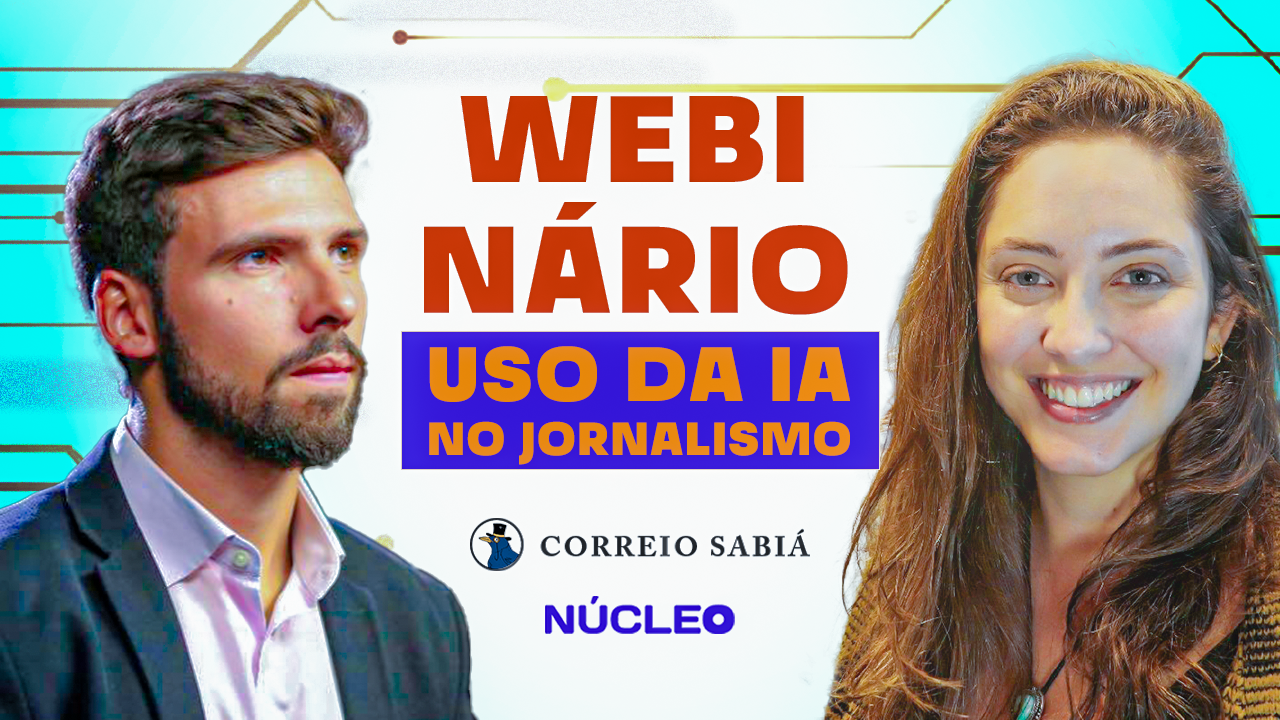
Correio Sabiá hosted a webinar about AI for the public.
The webinar was co-hosted with Nucleo Journalismo, another newsroom participant in our recent AI cohort. (You can watch the webinar, conducted in Portugese, here.)
“We highlighted the uses of artificial intelligence in journalism, based on our experience at Correio Sabiá, and also invited colleagues to share their projects and learnings,” Ferro said. “We discussed tools and the ethical implications of AI in journalism, opening the discussion to readers’ questions in the Zoom webinar after presenting use cases.”
Ferro said he considers the webinar and the WhatsApp group a success because:
- More than 80 people registered for the webinar.
- They have almost 100 active WhatsApp members in “Correio SabiAI.”
- They received emails, WhatsApp messages and Instagram DMs requesting the webinar recording.
- They saw spontaneous shares and praise across Instagram and other platforms.
These initiatives didn’t require big budgets or complex technology. What made it work was audience-first planning and partnerships. By leveraging WhatsApp, Instagram, Zoom and YouTube — platforms where their readers already are — Correio Sabiá lowered barriers to participation and built trust through transparency.
Ferro said Correio Sabiá plans to continue producing regular AI-focused events and increasing engagement through newsletters and its Correio SabiAI WhatsApp group.
“The goal is to conduct ongoing AI education that strengthens our audience while also helping us improve our journalistic production,” he said. “This model should be adopted in future AI events, which we want to make regular and we already have validation from our audience that there is demand for it.”
Read more about how the newsroom did this.
This education can empower the audience to critically evaluate the role of AI in the world and make decisions about how they use it and want to see it used in their communities. By demystifying complex technologies and explaining how they’re used in journalism and in your community, you can foster transparency and understanding. You can also model responsible exploration with tools that can seem intimidating.
Are you experimenting with AI literacy initiatives? Let me know! We are collecting examples and would love to see yours. Use this form to share it with us or feel free to get in touch with me: Lynn@TrustingNews.org.
Apply: TWO PAID opportunities to educate your community about AI
Here’s the part about how you can help (and get paid). We are accepting applications through Friday for our next two AI initiatives. We’re looking for newsrooms that want to experiment with educating their communities about AI — not just its use in news, but how it works, how the public can spot it and more.
There are two ways for newsrooms to get involved:
- A paid cohort to get $2,000 for experimenting with sharing AI education resources with your community (Extended deadline: August 29)
- $5,000 innovation grants for newsrooms that want to explore an idea to educate their community about AI (Deadline: August 29)
Find all the details and the applications here. Questions? Lynn@TrustingNews.org.
Resources to help you build trust with your use of AI
This is our last part of a newsletter series focused on our latest AI research. I’m diving into the AI literacy and education efforts, and I definitely still want to help newsrooms engage with their audiences about AI use and be transparent about that use. So, please reach out if you have an idea you want to brainstorm or want help with an AI use policy or listening initiative. And in the meantime, we hope you will use our NEW resources and tools to make your use of AI ethical and trustworthy. All of them can be found in the AI Trust Kit and below:
Resources to help you be ethical:
- A resource to help spot and disclose AI in content you don’t control.
- A collection of research to help you understand how the public feels about AI.
Resources to help you listen:
- A survey to learn how your community feels about AI and your use of it.
- A community interview guide to dive deeper into those feelings.
- Questions to ask to get regular community feedback on your use of AI.
Resources to help you be transparent:
- A worksheet to create an AI use policy.
- A worksheet to create in-story AI use disclosures.
- Sample language to copy/paste into AI use disclosures and policies.
- Newsroom examples of AI policies, AI use disclosures and other AI transparency initiatives.
At Trusting News, we learn how people decide what news to trust and turn that knowledge into actionable strategies for journalists. We train and empower journalists to take responsibility for demonstrating credibility and actively earning trust through transparency and engagement. Learn more about our work, vision and team. Subscribe to our Trust Tips newsletter. Follow us on Twitter, BlueSky and LinkedIn.

Assistant director Lynn Walsh (she/her) is an Emmy award-winning journalist who has worked in investigative journalism at the national level and locally in California, Ohio, Texas and Florida. She is the former Ethics Chair for the Society of Professional Journalists and a past national president for the organization. Based in San Diego, Lynn is also an adjunct professor and freelance journalist. She can be reached at lynn@TrustingNews.org and on Twitter @lwalsh.
